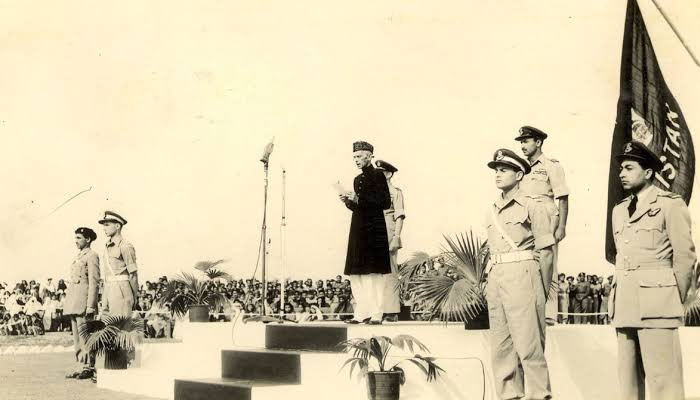
Unity, Faith, Discipline: Exploring Jinnah’s Motto in the Context of Modern-Day Pakistan
Every year on 23rd March, Pakistanis across the nation proudly celebrate Pakistan Day. It marks the historic moment in 1940 when the All-India Muslim League passed the Lahore Resolution, demanding a separate homeland for the Muslims of the subcontinent. This resolution eventually led to the creation of Pakistan in 1947. While the day is filled with patriotic songs, flag-hoisting ceremonies, parades, and speeches, its true spirit goes far beyond the surface celebrations. At the heart of Pakistan Day lies the powerful message of Quaid-e-Azam Muhammad Ali Jinnah’s guiding motto: Unity, Faith, and Discipline. These three simple words carry within them the philosophy that can shape not just a nation, but the mindset of its people.
Unity is the foundation of any strong and successful nation. When Jinnah spoke of unity, he was not only referring to the political unity required during the independence movement, but also the long-term social and national cohesion necessary to build and sustain Pakistan. Today, Pakistan is home to various ethnicities, cultures, and languages such as Punjabis, Sindhis, Baloch, Pashtuns, Kashmiris, and many more. Each group adds richness to our national identity, but sometimes, these differences are used to divide rather than unite. In the current era, we often see tension and conflict driven by political, religious, or regional differences. Social media, unfortunately, sometimes becomes a platform for spreading hate rather than promoting harmony. To truly honour Pakistan Day, we must remember that the real strength of Pakistan lies in its people standing together as one. We must learn to celebrate our diversity and work toward mutual respect, tolerance, and inclusion. Only through unity can we overcome the challenges that threaten our progress.
Faith, according to Quaid-e-Azam, was not limited to religious belief. While religion plays an important role in Pakistan’s identity, Jinnah used the word “faith” in a broader sense. It means having faith in the justice of our cause, faith in our values, and faith in the abilities of our people. It also means believing in the nation’s potential to rise, improve, and succeed even when the situation looks bleak. In modern-day Pakistan, where we face issues like inflation, unemployment, corruption, and political instability, it is easy to lose hope. But Pakistan Day serves as a reminder that the creation of our country was itself a miracle achieved against great odds. If our forefathers could achieve the impossible through determination and belief, we too can overcome the difficulties we face today. Faith gives us strength during hardship, and it inspires us to keep working toward a better Pakistan. We must believe in ourselves, trust the process of progress, and stay committed to the idea that Pakistan’s future can be brighter.
Of the three values Jinnah emphasized, discipline is perhaps the most lacking in our present-day society. Discipline is more than just following orders or maintaining silence in classrooms. It means behaving responsibly, respecting the law, being punctual, fulfilling duties sincerely, and putting the national interest above personal gain. It applies equally to students, professionals, politicians, and citizens at large. Unfortunately, many of our national problems can be traced back to a lack of discipline, whether it’s corruption in institutions, dishonesty in business, carelessness in public service, or even disregard for traffic laws on roads. Discipline is what ensures that systems run smoothly and fairly. A disciplined nation is an efficient, respectful, and successful one. As citizens, we can start with small acts: standing in lines patiently, showing up to school or work on time, throwing garbage in the right place, and speaking truthfully. These everyday actions, though small, create a culture of order and responsibility. On Pakistan Day, as we watch military parades that symbolize discipline at its finest, we must reflect on whether we apply the same principles in our civilian lives.
Pakistan Day is not just a date on the calendar. It is a moment to reflect on who we are, where we came from, and where we are going. Jinnah’s motto, Unity, Faith, and Discipline, is timeless. It applies to every generation, in every era, regardless of how much the world changes. These values are not meant to be quoted once a year in speeches. They are meant to guide how we live every single day. If we truly want to honour the spirit of 23rd March, we must go beyond waving flags and singing anthems. We must commit ourselves to becoming better citizens, more united, more hopeful, and more disciplined. The real tribute to our founding fathers lies in actions, not just words. It lies in building a Pakistan they would be proud of, a Pakistan where every child has access to education, every home has light, every person is treated with dignity, and every citizen plays their role honestly.
In conclusion, Unity, Faith, and Discipline are not just the founding principles of our nation but the very tools we need to build a stronger, more just, and more prosperous Pakistan. As we celebrate Pakistan Day, let us not limit our patriotism to one day of speeches and ceremonies. Instead, let us carry the spirit of this day into our daily lives. Our country does not need empty slogans; it needs responsible, honest, and united citizens. The advice for every Pakistani is simple yet powerful: live the change you want to see in your country. Be respectful, be truthful, fulfil your duties with sincerity, and always put Pakistan first. Only then can we truly honour the vision of Quaid-e-Azam and turn his dream into a lasting reality.





Comments are closed, but trackbacks and pingbacks are open.